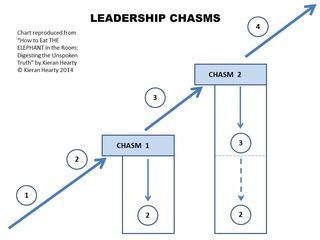“Management 2020: Leadership to unlock long-term growth.” That’s the title of a report issued earlier this month by The Commission on the Future of Management and Leadership, a commission formed by the All-party Parliamentary Group with the CMI to investigate how management and leadership in the UK will need to change by 2020 to deliver sustainable economic growth. It seems that productivity is a concern at higher level than we realise.
Maybe this shouldn’t be so surprising. The report identifies a number of challenges but the standout one for me was that, “Time wasted by poor management could be costing the economy as much as £19bn a year.” Rectifying that would certainly do wonders for the national economy and help bring down the national debt! No wonder parliament is looking at this.
Now I don’t know whether it’s serendipity or something more significant but this coincided with my reading Kieran Hearty’s “How to Eat THE ELEPHANT in the Room: Digesting the Unspoken Truth.” In any event, it seems to me that the answer to poor management is beautifully illuminated in a chart that Hearty presents, which I reproduce below with both admiration and gratitude.
What makes this so powerful is that what Hearty says is so patently obvious. It’s a case of the solution hiding in the open. Basically he identifies 4 states of employment:-
- Contributors – new hires endeavouring to prove themselves during a probationary period;
- Performers – employees who have established their credentials and endeavouring to do a good job;
- Managers – employees whose good work has been rewarded with responsibility to oversee others’ performance;
- Leaders – managers whose performance justifies promotion to share responsibility for the performance of the entire organisation or a sizeable portion.
Hearty argues that there is a huge chasm to cross when moving from a 2-3 and an even bigger one when moving from a 3-4. His rationale for this is that the basis for promotion is performance, which remains the primary criterion at every level. Consequently, the focus remains on performance with newly promoted employees not given the requisite training to enable them to help others with their performance and often “too busy” meeting performance demands to give others the time and support they need.
If you are looking to explain the £19bn shortfall, I don’t believe you need to look any further.
To parody Bill Clinton, “It’s about the people, stupid.” Productivity is ultimately a human measure and organisational performance is dependent on people. People power performance. Thus to solve the issues identified by the Commission you have to put greater emphasis on people. You have no other choice.
This model, and the simplicity with which it cuts through issues that are often made unnecessarily complex, also illustrates something else that is dear to my heart: management and leadership are not the same thing! Too often we treat them as interchangeable terms and they are not. We have to stop falling into the trap of thinking that they are.
More than this, though, we have to stop incentivising on the basis of performance. This emphasis on performance distracts while driving and distorting all our reward systems. It inverts the order of this model and means, even at the highest level, that managing becomes more important than leading. Furthermore, if this is not bad enough, it also breeds competition amongst the employees and so builds silos, dilutes synergy and destroys organisational integrity.
You really do not have to look any further to unlock leadership.


How wonderful to be quoted by the talented Bay Jordan! The book will be available on Amazon very soon.